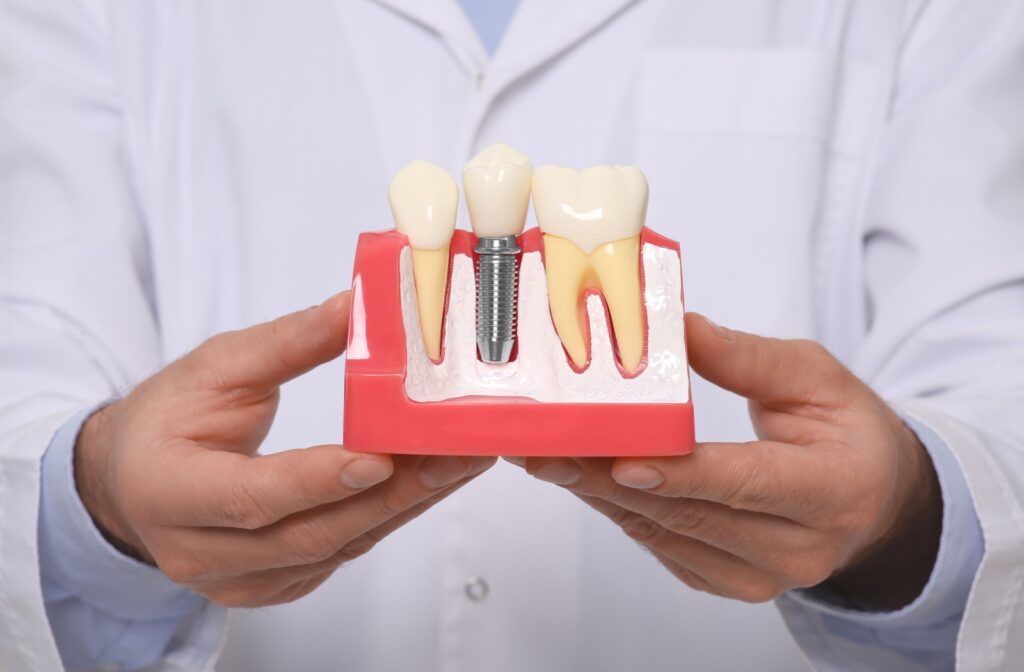Dental implants are an innovative restorative dentistry procedure that stands out in the constantly evolving field of dental health for their ability to restore function and aesthetics with remarkable effectiveness. Dental implants are intended to be a permanent fixture in your mouth and can last a lifetime with proper care. Although, it’s important to note that components related to the implant, such as bridges or crowns, may need maintenance or replacement throughout the implant’s lifetime.
Oral hygiene diligence and overall mouth health can impact an implant’s lifespan. So, it’s important to regularly see your dentist to maintain good oral health, maximize the life of implants, and maintain a healthy smile.
Understanding Dental Implants
Dental implants are synthetic tooth roots traditionally made from titanium metal, which act as a robust base for a customized dental crown. The implant is surgically placed into the jawbone, where it fuses over time in a process called osseointegration.
This union creates a sturdy foundation for the new tooth, making sure it performs like a natural tooth in both form and function. Dental implants have become the gold standard in tooth replacement for many dental patients, with a 90% to 95% success rate.
Factors Impacting Implant Longevity
Although implants are meant to be permanent, a few things could contribute to their lifespan.
Oral Hygiene
Your implant’s longevity depends heavily on your care, much like natural teeth. Good oral hygiene practices, including regular brushing and flossing, are essential to keeping the implant site clean and free from harmful bacteria.
Neglecting oral health can lead to a condition called peri-implantitis. This condition is similar to gum disease around natural teeth but affects the gums and bone around the implant, potentially causing bone loss and the implant’s failure.
Bone Health & Implant Stability
The health of your jawbone at the implant site is crucial. Significant bone loss can occur following tooth extraction, leaving insufficient bone to support an implant. This is why timely implant placement after tooth loss or extraction is important. Bone grafting procedures can often help rebuild the jawbone for those with existing bone loss, enabling them to benefit from dental implants.
Lifestyle Considerations
Certain habits and lifestyle factors can significantly affect the health of your dental implant. For example, smoking impedes the healing process and can increase the risk of implant failure. Teeth grinding (bruxism) can also affect the healing process, so solutions like wearing a nightguard may be necessary to protect the implant and extend its lifespan.
Best Practices for a Permanent Smile
There are things you can do to maximize the life of your dental implants and keep your mouth and teeth healthy.
At-Home Care
Caring for dental implants at home is straightforward, involving practices similar to those for natural teeth. Regular brushing and flossing are necessary to keep the implant and surrounding areas clean. An antiseptic mouthwash can also help reduce the bacterial load in the mouth. Your dentist may recommend specific tools or techniques designed to support implant care, and it’s crucial to follow their advice.
Professional Maintenance
Even with diligent at-home care, professional maintenance is important. Regular dental check-ups allow your dentist to monitor the health of your implants and address any issues early on. Professional dental cleanings adequately clean those hard-to-reach areas, reducing the risk of peri-implantitis and other complications.
Diet & Implant Health
A balanced diet plays an indirect but significant role in your dental implant maintenance. Nutrient-rich foods support overall oral health, while excessive sugar and acids can weaken the enamel of your natural teeth and the structure around your implants, such as the crowns and bridges. Moderation and a varied diet are beneficial to your oral health and your implants.
Longevity vs. Cost
While the initial cost of dental implants may seem higher than other options, their long-term value becomes apparent when considering their lifespan. The need for frequent replacements or repairs, which can be common with alternatives, can accumulate costs over time. This often makes dental implants a sound investment in your oral health.
Discuss Your Options with Your Dentist
Your smile, and by extension, your oral health, are vital to your overall well-being. While dental implants are not impervious to the effects of time and lifestyle, their track record and reliable performance put them at the forefront of tooth replacement options. You can make sure that your implants serve you well for many years to come by understanding the factors that influence implant longevity and adhering to the best practices.
Call us today at Arch King West Dental to book an appointment. One of our dentists can examine your mouth and evaluate your needs. We can review your options to determine whether dental implants are good for you.


